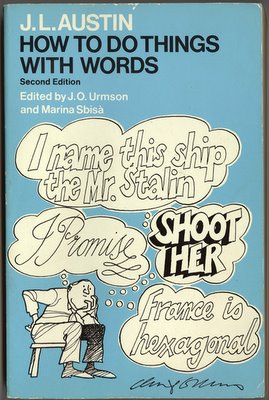
 Sunnyside Drive-In, Fresno, CA, 2002.
Sunnyside Drive-In, Fresno, CA, 2002.Photos by Wyeth.

 (Thanks to Wyeth for the scan of the cover.)
(Thanks to Wyeth for the scan of the cover.)


J.L. Austin’s How To Do Things With Words
Chapters 1-6
“Other Minds”
p. 81: IG Farben, German chemical company that made poison gas during WWII.
p. 89: “The awkwardness of some snarks being boojums”, from Lewis Carroll’s poem, “The Hunting of the Snark”:
"Come, listen, my men, while I tell you again/The five unmistakable marks
/By which you may know, wheresoever you go,
/The warranted genuine Snarks.
"Let us take them in order. The first is the taste,
/Which is meager and hollow, but crisp:
/Like a coat that is rather too tight in the waist,
/With a flavor of Will-o-the-wisp.
"Its habit of getting up late you’ll agree/
That it carries too far, when I say
/That it frequently breakfasts at
"The third is its slowness in taking a jest.
/Should you happen to venture on one,
/It will sigh like a thing that is deeply distressed:
/And it always looks grave at a pun.
"The fourth is its fondness for bathing-machines,/Which it constantly carries about,/
And believes that they add to the beauty of scenes-
/A sentiment open to doubt.
"The fifth is ambition. It next will be right
/To describe each particular batch:
/Distinguishing those that have feathers, and bite,
/And those that have whiskers, and scratch.
"For, although common Snarks do no manner of harm,
/Yet, I feel it my duty to say,
/Some are Boojums-" The Bellman broke off in alarm,
/For the Baker had fainted away.”
p. 93: chivvy, to chase, worry
p. 94: allotropic, the existence of two or more forms of a chemical element
p.98: D.V., Diis Volentibus (Latin: If the Gods Want, epigraph) (not sure about this one, it’s only a guess)
p. 101: gravamen, the essence or most serious part of a complaint or accusation
p.104: Wykehamist, graduate or student of
p.106: sequelae (pl. of sequela), condition that is the result of a previous disease or injury
p. 113: ex vi termini, By force of the term (in this context: simply in virtue of what the words mean)